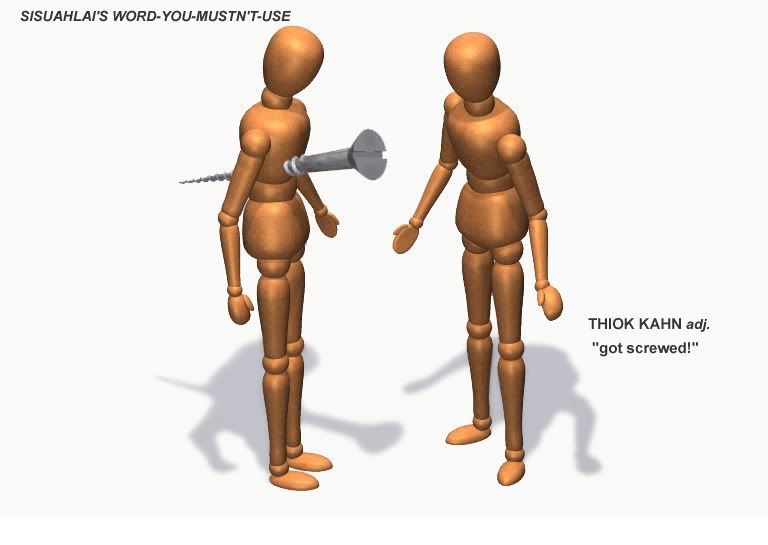The Truth and Secrets about Doctors and their Medical Training
I am about to set a dangerous precedence. However, if you've been a regular Sisuahlai reader, you are probably intelligent enough to know not to take anything too seriously here, that these views are personal, and importantly, to read between my lines. Here goes.
I am going to write another "medical" entry, perhaps faintly influenced by the recently leaked sodomy claim medical notes. This time, I want to let you in on some secrets about medical training and the workings of the average doctor's mind (or brain, if the mind is absent).
Most of us, if not all, have at least one unpleasant encounter with doctors. My experience is probably a little bit more biased, more exaggerated, as I had worked with them and occasionally supervised some of them. First, let's be clear: The reason some of you might find certain doctors unpleasant has nothing to do with the profession itself.
The medical profession itself is amoral. It does not differentiate good or evil. It is designed to detect and understand bodily disorder and then using proven scientific applications to restore the body back to health or comfort or simply prolonging life (usually as a mean to please loved ones). Sometimes, it may take the telepathic course of addressing health hazards or sometimes called preventative medicine. Basically, medicine is amoral.
Ok, now for the secrets.
SECRET 1: Doctors are not as clever as you think.
To be accepted into medical school, you are required to be an A star student (i.e. good at getting high marks) and to appear conventional. Eccentricity is a rarity in the medical world, that is why I enjoy watching House more than E.R.
You don't find many geniuses in the medical field, because if you are truly intelligent, you'd probably figure out that a lifetime of service is best reserved for people who enjoy routine. Geniuses and highly intelligent people just do not like routine - they get distracted and get bored too easily.
Majority of doctors are work-horses. Nobody doubt they could persevere if needed to. But most of the time, their work is not as cerebral as one might like to think. They just do routine stuff really well. Specialist doctors are doctors who are very good at their specific routines. When these people are required to think outside these routines, most will struggle.
SECRET 2: Any doctor would know that medical science is incomplete, but but it is still the best out there. But not many have the ability to convince patients to stick to proven evidence-based medicine.
Most of our modern medical treatment are non-curative in nature. The last discovery of a true medical cure for something was the antibiotics, and that was eons ago! Modern medicines however are good at masking symptoms, replacing discomfort with something more soothing and they are also good for altering numbers on scales (e.g. cholesterol level, blood pressure etc). This lack of cure in the medical marketplace has led many ignoramus seeking for alternative non-proven junks (herbal supplements, tablets with concentrated vitamins, liquid with ultra-diluted substances etc). Having doctors who are poor at conveying the right messages only serve to increase the sales of those junks. I blame doctors with poor communication skills for the massive alternative health market in Asia.
SECRET 3: Doctors frequently give diagnosis that they are most familiar with.
It is highly unlikely that you will leave the neurologist clinic with the diagnosis of fungal granuloma. The point is this, every doctor has their own strength. Just like you are better at certain subjects in school. Most doctors tend to adopt a quick-fix thinking based on what they encounter most. This subconscious approach blinkered them from other non-familiar diagnoses, even if highly probable.
SECRET 4: Medical school is not that tough! Easier to get a "Dr" title from medical school than a mentally-torturing PhD course
To pass medical finals, you need to display two essential things: the ability to regurgitate textbook answers under timed condition and to demonstrate the minimum level of maturity in front of examiners. You will hardly ever be given complex situation to solve. As long as you show that you are safe (do not harm patient!), it does not matter if you miss the diagnosis by a mile, they will still probably pass you. However, they will definitely fail you if you start acting weird and utter inappropriate words in your clinical exams.
SECRET 5: The knowledge is seldom wrong, but the attitude sucks.
A lot of sound clinical knowledge that a doctor gained are really through their actual working experience. So by the time they reach their 3rd or 4th year of hospital service, they are probably good enough to run a good thorough examination and telling you what could be wrong with your body. But not all will grow into likeable characters. The general public typically regard "a good doctor that we trust" as someone who can tell them stuff they want to hear and is approachable (easy to talk to) - even if the diagnosis given was wrong!! So for most, the attitude of their doctor ultimately decides how they manage their illnesses - not the doctor's experience or knowledge per se. Scary.
My personal definition of a good doctor is a suitably seasoned, healthy worrier that reads a lot. I don't ask too much.
I am going to write another "medical" entry, perhaps faintly influenced by the recently leaked sodomy claim medical notes. This time, I want to let you in on some secrets about medical training and the workings of the average doctor's mind (or brain, if the mind is absent).
Most of us, if not all, have at least one unpleasant encounter with doctors. My experience is probably a little bit more biased, more exaggerated, as I had worked with them and occasionally supervised some of them. First, let's be clear: The reason some of you might find certain doctors unpleasant has nothing to do with the profession itself.
The medical profession itself is amoral. It does not differentiate good or evil. It is designed to detect and understand bodily disorder and then using proven scientific applications to restore the body back to health or comfort or simply prolonging life (usually as a mean to please loved ones). Sometimes, it may take the telepathic course of addressing health hazards or sometimes called preventative medicine. Basically, medicine is amoral.
Ok, now for the secrets.
SECRET 1: Doctors are not as clever as you think.
To be accepted into medical school, you are required to be an A star student (i.e. good at getting high marks) and to appear conventional. Eccentricity is a rarity in the medical world, that is why I enjoy watching House more than E.R.
You don't find many geniuses in the medical field, because if you are truly intelligent, you'd probably figure out that a lifetime of service is best reserved for people who enjoy routine. Geniuses and highly intelligent people just do not like routine - they get distracted and get bored too easily.
Majority of doctors are work-horses. Nobody doubt they could persevere if needed to. But most of the time, their work is not as cerebral as one might like to think. They just do routine stuff really well. Specialist doctors are doctors who are very good at their specific routines. When these people are required to think outside these routines, most will struggle.
SECRET 2: Any doctor would know that medical science is incomplete, but but it is still the best out there. But not many have the ability to convince patients to stick to proven evidence-based medicine.
Most of our modern medical treatment are non-curative in nature. The last discovery of a true medical cure for something was the antibiotics, and that was eons ago! Modern medicines however are good at masking symptoms, replacing discomfort with something more soothing and they are also good for altering numbers on scales (e.g. cholesterol level, blood pressure etc). This lack of cure in the medical marketplace has led many ignoramus seeking for alternative non-proven junks (herbal supplements, tablets with concentrated vitamins, liquid with ultra-diluted substances etc). Having doctors who are poor at conveying the right messages only serve to increase the sales of those junks. I blame doctors with poor communication skills for the massive alternative health market in Asia.
SECRET 3: Doctors frequently give diagnosis that they are most familiar with.
It is highly unlikely that you will leave the neurologist clinic with the diagnosis of fungal granuloma. The point is this, every doctor has their own strength. Just like you are better at certain subjects in school. Most doctors tend to adopt a quick-fix thinking based on what they encounter most. This subconscious approach blinkered them from other non-familiar diagnoses, even if highly probable.
SECRET 4: Medical school is not that tough! Easier to get a "Dr" title from medical school than a mentally-torturing PhD course
To pass medical finals, you need to display two essential things: the ability to regurgitate textbook answers under timed condition and to demonstrate the minimum level of maturity in front of examiners. You will hardly ever be given complex situation to solve. As long as you show that you are safe (do not harm patient!), it does not matter if you miss the diagnosis by a mile, they will still probably pass you. However, they will definitely fail you if you start acting weird and utter inappropriate words in your clinical exams.
SECRET 5: The knowledge is seldom wrong, but the attitude sucks.
A lot of sound clinical knowledge that a doctor gained are really through their actual working experience. So by the time they reach their 3rd or 4th year of hospital service, they are probably good enough to run a good thorough examination and telling you what could be wrong with your body. But not all will grow into likeable characters. The general public typically regard "a good doctor that we trust" as someone who can tell them stuff they want to hear and is approachable (easy to talk to) - even if the diagnosis given was wrong!! So for most, the attitude of their doctor ultimately decides how they manage their illnesses - not the doctor's experience or knowledge per se. Scary.
My personal definition of a good doctor is a suitably seasoned, healthy worrier that reads a lot. I don't ask too much.





 Your Chance to be (in)Famous!
If you want your photo (or any picture) to feature on Sisuahlai, please send it to
Your Chance to be (in)Famous!
If you want your photo (or any picture) to feature on Sisuahlai, please send it to
1 Comments:
I couldn't agree more :)
There's this public perception that doctors are a genious bunch of professionals. This mentality has made doctors snobbish. I don't mean all....but many.
Post a Comment
<< Home